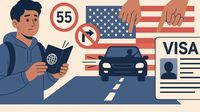In a significant crackdown on international students, the United States has revoked F-1 student visas for dozens of Indian students due to minor criminal offenses, raising concerns about fairness and the implications of such actions on freedom of expression. This wave of visa cancellations, which has affected students at universities in Missouri, Texas, and Nebraska, follows a previous set of deportation notices linked to alleged campus activism reported in March.
The offenses leading to these visa revocations range from traffic violations, such as over-speeding and driving without a licensed supervisor on a learner’s permit, to more serious but resolved incidents like shoplifting and alcohol-related charges. Designated School Officials (DSOs) at various institutions have informed students via email that their records in the Student and Exchange Visitor Information System (SEVIS) have been terminated, rendering their Form I-20, Employment Authorization Document (EAD), and legal presence in the U.S. invalid.
Emails from DSOs clarify that a revoked F-1 visa in a student’s passport is no longer valid, urging those still in the U.S. to make prompt arrangements for departure. Immigration attorneys have described this response as highly unusual, particularly for minor infractions that do not typically warrant such severe consequences. A Texas-based lawyer handling approximately 30 similar cases has noted a surge in inquiries from distressed Indian students, pointing out that SEVIS terminations for petty offenses like failing to stop at a red light are rare in precedent.
Many students assert that their violations occurred years ago and were fully addressed through legal channels. For instance, a student in Texas arrested for shoplifting items valued at USD144 from Walmart had the case dismissed due to a clean academic record and full cooperation with authorities, yet still faces deportation. Consultants and legal experts emphasize that while U.S. universities typically warn international students about the gravity of legal infractions during orientation, the revocation of SEVIS records for such minor, often resolved cases marks a shift in enforcement patterns. Affected students are advised to seek immediate legal counsel if the offenses are over a year old.
This crackdown intensifies the challenges faced by Indian students navigating an already complex U.S. immigration system. The situation is compounded by reports of visa revocations for foreign nationals at major colleges, including Harvard, Tufts, and Stanford, amid broader efforts by the Trump administration to tighten oversight of international students.
According to Secretary of State Marco Rubio, over 300 visas have been canceled recently, with many students and recent graduates from California facing similar fates across multiple campuses, including UCLA, UC Berkeley, and UC Davis. Among the most high-profile cases is Rumeysa Ozturk, a Turkish national and PhD student at Tufts University, who was detained last month by federal agents while walking down the street. Another involves Mahmoud Khalil, a recent graduate of Columbia University, whose visa was revoked after he participated in pro-Palestinian demonstrations.
As universities grapple with these sudden cancellations, officials express concern over the lack of transparency from federal authorities. In many cases, schools learned of the cancellations only after reviewing federal immigration records, leaving them scrambling for answers. This has raised alarms about the implications for free speech and the overall treatment of international students in the U.S.
University officials from institutions including Harvard, Stanford, and the University of Michigan have reported being caught off guard by the sudden cancellations. Some students had their visas canceled for past speeding tickets or for engaging with pro-Gaza content online, with Indian students particularly affected. Reports indicate that federal agencies are combing through online content to flag signs of “terrorist sympathies,” leading to investigations based on seemingly innocuous social media activity.
One of the most concerning aspects of this crackdown is the implementation of an AI-driven program, allegedly named Catch and Revoke, which is reportedly being used to identify students suspected of supporting Hamas or other designated terrorist groups. The program has raised ethical concerns among university administrators, who argue that it represents a significant departure from standard protocol and could have a chilling effect on free speech among international students.
Ranjani Srinivasan, a 37-year-old Indian PhD student at Columbia University, was forced to self-deport to Canada after immigration agents revoked her visa and arrived at her home. Another student, Badar Khan Suri, pursuing conflict studies at Georgetown University, was detained after his visa was revoked based on allegations of antisemitic speech and ties to Hamas. Suri denies the claims, stating he is being targeted due to his wife’s Palestinian background.
The crackdown intensified following a directive issued on March 25 by U.S. Secretary of State Marco Rubio, which mandated social media background checks on international students and applicants. Rubio confirmed the policy shift, stating, “Every time I find one of these lunatics, I take away their visa. We will continue revoking visas every day. Anyone engaging in pro-Hamas rhetoric, online or in person, will face consequences.”
While the legal framework allows U.S. authorities to revoke visas for multiple reasons, university administrators have expressed concern that the lack of transparency and sudden enforcement represent a stark departure from standard practices. They worry that this will have a chilling effect on free speech among the country’s international student population.
The 2024 Open Doors Report revealed that the U.S. hosted a record 1.1 million international students during the 2023–24 academic year, including over 330,000 from India. As these students navigate an increasingly complex and hostile immigration landscape, their futures hang in the balance, prompting urgent calls for clarity and fairness in the enforcement of immigration policies.








